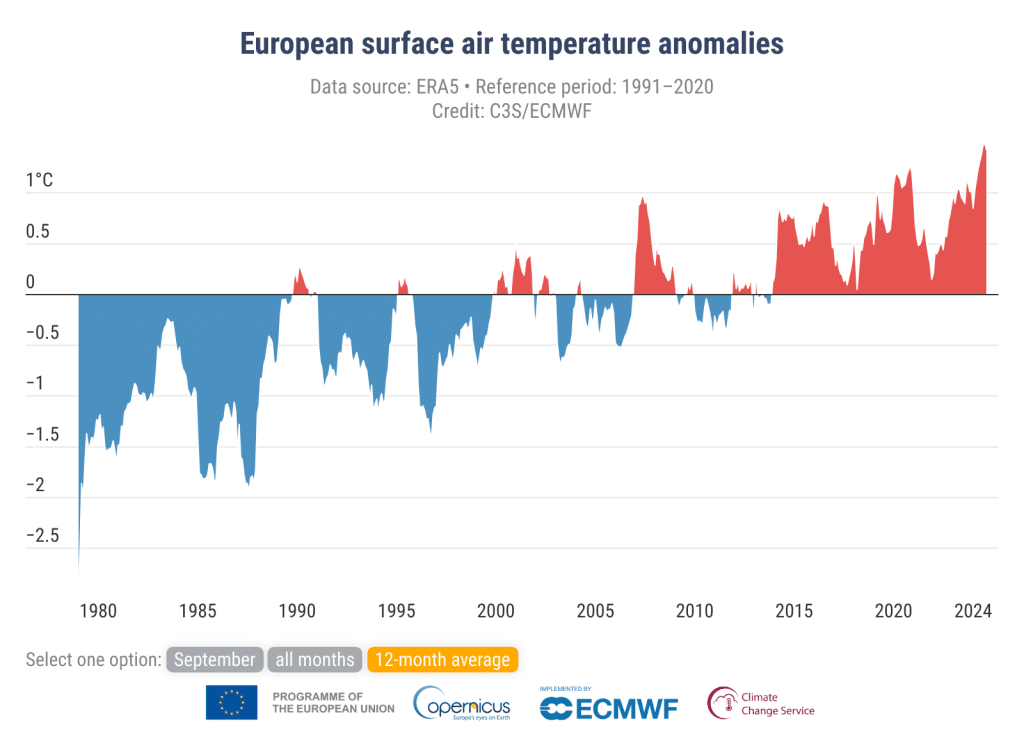Unusual warmth in the Tropical Atlantic that fuelled the historic storm that hit Valencia earlier this week was made at least 50 to 300 times more likely by human-made climate change.
—
The deadly storm that battered Valencia, a province in eastern Spain, earlier this week was fuelled by excessive heat in the Tropical Atlantic ocean.
Torrential rains hit Spain’s eastern region of Valencia on Tuesday, unleashing catastrophic flooding that killed at least 158 people, with dozens still missing on Thursday. 500 millimeters (20 inches) of rain – a year’s worth for some locations – fell in just eight hours, trapping people in their homes and cars.
According to Climate Central, a non-profit news organization that analyzes and reports on climate science, the storm responsible for the unprecedented floods was fuelled by warmer-than-usual sea waters.
“The low-pressure system driving these historic floods tapped into an atmospheric river” – a long, narrow corridor of concentrated moisture in the atmosphere, the non-profit said on Thursday. It added that the atmospheric river was transporting excessive moisture it drew from the abnormally warm waters of the Tropical Atlantic, which exacerbated the intensity of the rainfall and contributing to the catastrophic deluge.
The elevated sea surface temperatures were made at least 50 to 300 times more likely by human-caused climate change, according to Climate Central.
Climate change is intensifying the water cycle, bringing more intense rainfall and associated flooding.
As ocean surfaces warm, so does the air above it, causing water to be carried up to high altitudes to form clouds, while leaving a low pressure zone beneath causing more air to rush in. The warmer the air, the more water it can hold: for every extra degree Celsius of warming, air can hold 7% more moisture.
In September, a similarly destructive storm battered through parts of central and eastern Europe, unleashing some of the region’s worst flooding in modern history. The storm was also fuelled by hotter-than-usual water, this time in the Mediterranean and Black Seas.
Fastest-Warming Continent
Temperatures across Europe have been consistently higher than usual for months. The continent just had its hottest summer on record and a hotter-than-usual September, with the average monthly temperature at 6.47C. This is 1.74C higher than the 1991-2020 average for that month.
Europe is the world’s fastest-warming continent. Here, heat-related mortality has already increased by around 30% in the past two decades, coinciding with a rise in the average temperature. A recent study attributed nearly 48,000 deaths in the country in 2023 to extreme heat.

This string of record temperatures makes it increasing likely that 2024 will be the hottest year on record, beating 2023.
This story is funded by readers like you
Our non-profit newsroom provides climate coverage free of charge and advertising. Your one-off or monthly donations play a crucial role in supporting our operations, expanding our reach, and maintaining our editorial independence.
About EO | Mission Statement | Impact & Reach | Write for us
This post was originally published on here





